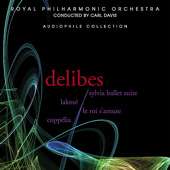|
Back
04/02/2011
Léo Delibes: Sylvia Ballet Suite – Lakmé – Le Roi s’amuse – Coppélia
Lillian Watson (Soprano), Christine Cairns (Mezzo-Soprano), Royal Philharmonic Orchestra, Carl Davis (Conductor)
Recording: C.T.S. Studios, London, England (February 1996, Original Release) – 64’ 16
Royal Philharmonic Masterworks #28730 – Booklet in English

Virtually covering every conceivable corner of the musical universe, Carl Davis conducts the luscious and oft approachable music of Léo Delibes in this reissue by Allegro Music. The CD is fittingly digestible and aptly summarizes the composer’s works, extracting excerpts of ballet, opera and incidental music. Whether a seasoned fan or a neophyte’s attempt to delve into French romanticism, the Royal Philharmonic Orchestra has something for everyone.
Sylvia (1876), a ballet drawn from the days of Arcadian mythology, contains some of Delibes’ most memorable pieces including the Wagnerian rally rouser “Les Chasseresses”, a perky humoresque “Intermezzo”, the “Pizzicati” fortified with plucky forward thinking strings and the orchestral majesty of “Cortège de Bacchus” brimming with waves of legato, reminiscent of Aida’s processional march.
The only opera to remain in today’s repertoire by Léo Delibes is Lakmé with its weighted Far East exotica. In “Sous le dôme épais” Lillian Watson’s pairing alongside mezzo-soprano Christine Cairns is a suitable match: vocally balanced, well guided while containing a disappointingly volumetric recording glitch in the echoing refrain.
An unusually high tessitura for Lakmé is a calculated risk for any coloratura soprano; nonetheless, in the “Air des clochettes” Watson manages the staccato trickiness sufficiently, but appears loosely rushed in her runs, giving the impression she’s short on breath. Her interpretation is dramatically passionate, alongside a vein of shrill timbre.
Delibes would later go on to write a series of ancient airs and dances as incidental music for Victor Hugo’s Le Roi s’amuse, the 1832 play that was banned for half a century. Carl Davis’ reverent politesse captures the elegant “Gaillarde”, a moody but dignified “Pavane”, the hymn-like Puritanical “Madrigal”, and ending with the somewhat urgent melancholic “Passepied”.
Premiering in 1870 at the Théâtre Impérial de l’Opéra was Delibes’ celebrated comic ballet Coppélia, a few months ahead of the impending Franco-Prussian War. Although this disruption halted engagements in Paris for a almost a year, it returned to stage and was the most frequently performed ballet of its time. Based on E.T.A. Hoffmann’s diabolical works Der Sandmann and Die Puppe, Coppélia takes on a lighter, waggish edge infused with cognizant melodies.
The abbreviated “Introduction” is sublime as strings immediately follow the softened hints of French horns. Davis then transitions nicely into the recognizable “Mazurka” con gusto that turns into a waltz-like rhythm bearing a resemblant panache of Thomas’ Hamlet ballet music, La Fête du printemps. The tempo is steady and assured. Many choice pieces are found in Coppélia, and Carl Davis makes a most democratic selection. Be it the expressive cellos in “La Fête des horloges”, the expansive violin tremolo during an unhurried “Notturno” or the twittering brio of introductory piccolos during the “Musique des automates”, it’s carried out with thoughtful intent.
Since a broad range of musical dynamics prevail within the chapters of Delibes, a strong suggestion would be to listen with headsets and discern how intricately detailed Carl Davis paints the vastly different scores. Though the recording is a bit flat and sterile, what remains as “shallow” can be overlooked if additional bass is inculcated for attenuated stereo sonority.
Christie Grimstad
|